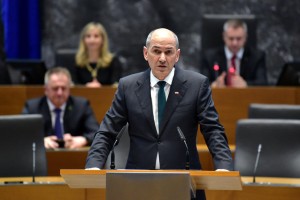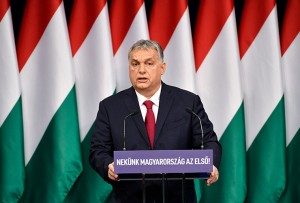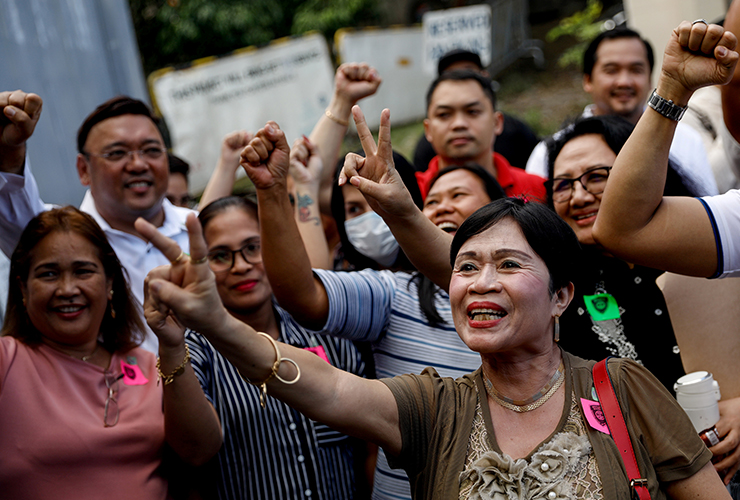
Photo: Slovenia’s Prime Minister Janez Jansa. EPA-EFE/FRANCISCO SECO / POOL
By Jamie Wiseman, IPI Advocacy Officer.
September 1, 2020
Few countries in Europe have experienced such a swift downturn in press and media freedom after a new government came to power than in Slovenia under veteran Prime Minister Janez Janša.
In the last six months, the outspoken PM, who took office in March 2020 and previously governed the country on two prior occasions, has immediately renewed long-standing grievances with the press and denigrated critical media outlets.
Going far beyond reasonable criticism, experts say, Janša has launched a series of vitriolic attacks on reporters on Twitter, enabling a wider increase in digital harassment from online trolls and contributing to an increasingly hostile climate for watchdog journalism.
Janša’s inflammatory attacks and his willingness to denounce critical reporting as #FakeNews have also drawn uncomfortable parallels with other leaders and brought Slovenia to the attention of press freedom groups, the OSCE and top EU bodies.
But the attacks on journalists do not end with social media abuse. Janša’s right-wing Slovenian Democratic Party (SDS) has again begun to try and exert greater influence over the country’s small media market as part of what it claims is an effort to promote greater media pluralism.
In addition to the introduction of legislation aimed at defunding the public broadcaster, Janša has also attempted to personally amplify his party’s pro-government media system, much of which are funded by Hungarian media linked to Viktor Orbán, who has dismantled media freedom and pluralism in Hungary over the past 10 years by pioneering a system of media capture inside the EU. These developments raise red flags about the possible export of the Orbán system of media control to Slovenia.
Taken together, this has culminated in a worrying decline in press freedom in a very short space of time in a country previously considered a relative safe haven for independent journalism , sending up further warning signs about deteriorating media freedom in Central Europe.
New Administration, Old Agenda
For many Slovenian journalists, however, the overriding feeling is one of déjà vu. As one of the most prominent figures within Slovenian politics in the last three decades, this is certainly not the first time 61-year-old Janša has courted criticism for undermining press freedom.
After serving as defence minister in Slovenia’s first democratic government following independence, he then went on to lead two administrations from 2004 to 2008 and from 2012 to 2013 before spending almost a year in prison on corruption charges, until his conviction was unanimously overturned by the Constitutional Court in 2015.
Throughout this turbulent career, he has been accused of censorship, abuse of state advertising, and faced an ongoing criminal case for calling two female journalists “washed-up prostitutes”. Propelled to office again in mid-March as the Covid-19 pandemic began, he and his administration have wasted little time in taking on perceived enemies in the media.
“History is repeating itself in Slovenia”, Anuška Delić a Slovenia-based journalist and founder of Oštro, a centre for investigative journalism in the region, told IPI. “Except this time around, SDS have taken the gloves off.”
Attacks on Media and Journalists Begin
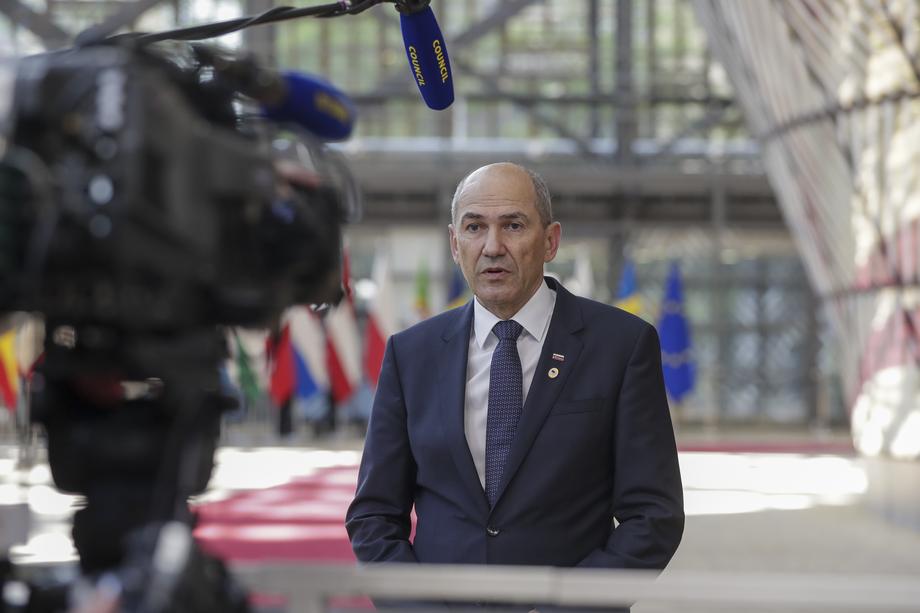
Slovenia’s Prime Minister Janez Jansa arrives speaks to the media during the second day of the European Council in Brussels, Belgium, 18 July 2020. EPA-EFE/STEPHANIE LECOCQ
“From the moment they took power, literally within days and during one of the worst crises we’ve faced, they started verbally attacking members of the media”, Nataša Briški, co-founder and editor-in-chief of Meta’s list and a former journalist at Slovenian outlet POP TV, told IPI. “The viciousness of the attacks is hard to comprehend and the number of attacks is growing, not decreasing.”
“What’s new is the extreme level of public bashing and smears”, Primož Cirman, founder and editor-in-chief of Slovenian investigative news website Necenzurirano, added. “Previous governments would of course be angry at coverage and there would be some level of criticism. But press freedom was respected. You didn’t have a situation where there are personal attacks on critical journalists.”
“In general, the climate has become much more adversarial”, Aljaž Pengov Bitenc, a Slovenian journalist, political analyst and co-host of several podcasts on media and politics, agreed. “The animosity between Janša, SDS and the media is long-standing, and the Prime Minister has turned denigrating the media into something of an art form.” (Pengov Bitenc is also a contributor to IPI’s Media Freedom in the Shadow of Covid reporting series.)
Much like the U.S. president, 280-character Twitter jabs are the main weapon here. “Criticism of the media during previous administrations was always there, but now we have Twitter, so it’s even more direct”, Marko Milosavljevic, an associate professor at the Department of Journalism in the University of Ljubljana, told IPI. “Fundamentally the press are seen by the Janša government as adversaries. The mentality is always be aggressive, always attack.”
Established outlets such as Dnevnik and Mladina are among the most common recipients. Soon after re-election, the prime minister also fired off tweets accusing left-leaning daily Delo of serving “deep-state tycoons”, adding the hashtags #FakeNews and #Presstitution after it criticised him. However, this animosity is often meted out to right-wing press such as weekly magazine Reporter when it got on the wrong side of the PM.
In mid-March, a government account retweeted a claim that well-known investigative journalist Blaž Zgaga was an “escaped psychiatric patient”. Soon after he began receiving numerous online death threats and smears, drawing condemnation from the OSCE. When press freedom groups including IPI wrote to EU leaders over the pressure on Zgaga, Janša then retweeted an article suggesting the groups were under the influence of cocaine, while other criticism was labelled “fake news”. Foreign journalists have not escaped the prime minister’s ire either, with one journalist for Deutsche Welle being targeted on Twitter.
Long-Held Contempt for Media
Important for an international audience to understand here is where this contempt for much of the media comes from. “After independence from Communist rule in 1991, media in Slovenia began to be privatized and often it was moguls and tycoons from the previous regime that took over”, Cirman, of Necenzurirano, told IPI. “Since then, despite democratization and generational changes in structure, editors and journalists over the last 30 years, Janša has always seen the media as retaining residue from the Communist era and an inherent bias against him and his right-wing party.”
Under this view the current public broadcaster is the heir of the Yugoslav-era state media, he explained, while much of the mainstream media meanwhile represent a “deep state” legacy of Communism. For Janša the liberal press embody the spectre of cultural Marxism, which he recently described as the main ideological threat facing Europe. This latest “war with the media”, can therefore be understood as an attempt rebalance what he sees as the biased development of country’s media market, Cirman added.
The clearest example of this thinking was crystalized in a letter written and signed by Janša in May that was published on the government website, simply entitled “War with the media”. In the text the prime ministeroutlined his long-held views on distrust and disdain for mainstream media, denouncing it as a malign and unelected force which had assigned itself the role of “moral judge of political correctness” in Slovenia.
“The content of the letter was nothing new: it was a ‘best of’ collection of insults and grudges Janša has been hurling at the media for the past quarter century”, Bitenc explained. “But using the official government portal for airing personal grievances is unheard of. In doing this, the PM gave the appearance of his stance towards the media being an official government position.”
Worryingly however, this has often seemed to be the case. In August, Uroš Urbanija, the acting director of the Government Communication Office tweeted urging citizens to report and denounce journalists in Slovenia who “obviously and shamelessly use manipulations”. Back in April, Interior Minister Aleš Hojs also called for journalists and media workers who reported from the scene of anti-lockdown protests to face criminal prosecution. An official letter from the government’s Communications Office to the Council of Europe in April also attacked the journalistic standards of the country’s press and argued that “the majority of the main media in Slovenia have their origins in the former communist regime”.
Officials Enabling Increase in Online Harassment
This animosity from officials has enabled increasing harassment of journalists online, experts say. These concerns have been spelt out by the president of the Slovenian Journalists’ Association (DNS), Petra Lesjak Tušek, who warned in August of growing hateful rhetoric and threats against journalists online. “When the PM uses disqualification [of journalists] as a part of normal political discourse, it becomes somehow normal”, Tušek told IPI. “So now everybody thinks they can be insulting, there is no more holding back, no more decency.”
Previous analysis by IPI also found trolling of journalists has intensified markedly in recent months due to increasing polarization, with female journalists suffering disproportionately. “Online harassment is a big issue”, explained Delić. “Journalists, including myself, are being attacked on a daily basis, often with vicious insults. Much of this comes from government supporters and online trolls, but also right-wing media controlled by SDS.”
Sources inside another of the country’s most popular commercial TV channels, POP TV, who spoke to IPI under continuation of anonymity, described a similar concern over online harassment. Worryingly, these attacks already seem to be taking a toll. “Some journalists are beginning to self-censor in order to avoid smear campaigns either by members of the governing SDS party or their collaborators on social media”, Briški said.
This situation has even drawn condemnation from within the academic community in Slovenia. In May, several scholars at the Department of Journalism at the University of Ljubljana took the unorthodox step of signing joint statement criticizing what they saw as the increasingly hostile climate for media under the new administration. In the text, the academics noted that the “subordination journalism and humiliation of journalists” had become part of “everyday life”.
Slovenian Public Broadcaster in the Firing Line
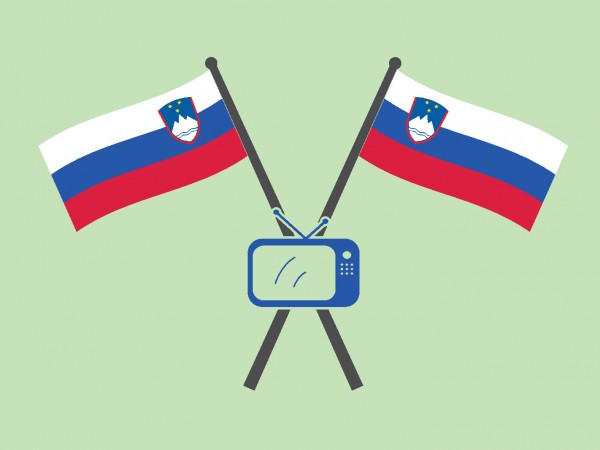
Graphic: Shutterstock
None are more aware of this than those journalists working for the public broadcaster, Radiotelevizija Slovenija (RTVSLO). A long opponent of the broadcaster and its license fee, Janša wasted little time in renewing his attacks on the broadcaster after re-entering office. Weeks into the new administration, Janša set the tone when he accused the public broadcaster of spreading lies about the government and issued a veiled threat over its funding.
“Do not spread lies. We pay you to inform, but not to mislead the public during these times. Obviously, you are overpaid and well paid”, Janša posted on Twitter, garnering a strong response from RTVSLO Director General Igor Kadunc and criticism from the OSCE Representative on Freedom of the Media.
Ne širite laži, @InfoTVSLO Plačujemo vas za to, da v teh časih informirate, ne pa zavajate javnost. Očitno je vas preveč in ste predobro plačani. @RTV_Slovenija https://t.co/Qwj1p79OmT
— Janez Janša (@JJansaSDS) March 20, 2020
Since then the attacks on RTVSLO only worsened. On June 8, Janša openly accused the public broadcaster trying to “overthrow” his government through its coverage of anti-government protests. On other occasions Janša has called the broadcaster “totalitarian” and a “media killer”, accusing it of feeding “an atmosphere of intolerance and hatred (…) created by a narrow circle of female editors with family and capital ties to the pillars of the deep state”.
These attacks have often fed into highly personalized smears against prominent female RTVSLO journalists by media controlled by the SDS. One executive at the broadcaster who spoke to IPI under the condition of anonymity said many female journalists were struggling to cope with the constant barrage of online harassment and insults, while others had considered quitting their jobs.
In recent months, online harassment has also spilled over into verbal and physical attacks. On March 31, a RTVSLO crew was verbally abused as they were reporting on the coronavirus lockdown in Ljubljana. The assailant then returned to the crew’s vehicle and deflated its tyres. Days previously, another company vehicle was vandalized. In another incident, a team of journalists from the Dobro Jutro (Good Morning) show were harassed on the streets of Maribor. In June, journalist Eugenija Carl received an envelope addressed to her containing a threatening handwritten note and a mysterious white powder.
RTVSLO: Financial Future in Jeopardy
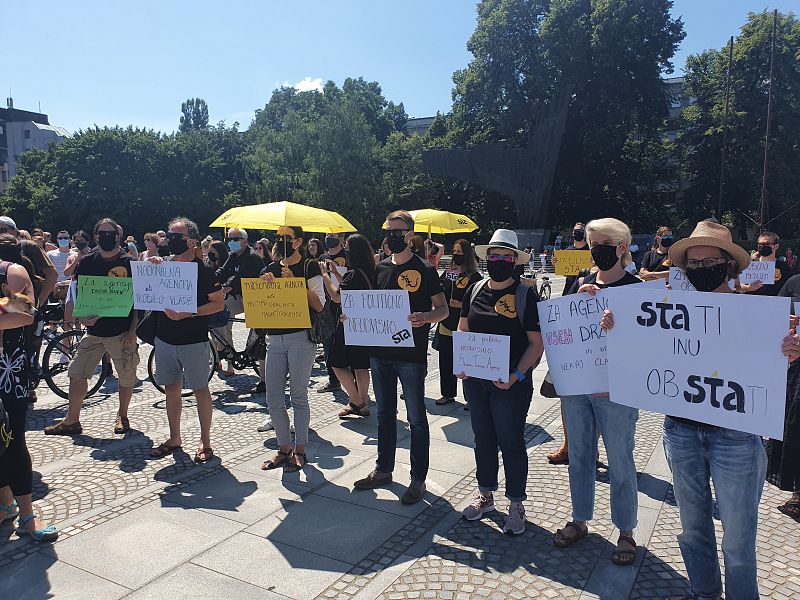
Journalists for the Slovenian Public Broadcaster protest in Ljubljana over draft law. Source: Slovenia Journalists Association.
While PM’s Twitter attacks on RTVSLO were in part aimed at firing up the party’s base, they was also aimed at creating a groundswell of public opinion for what was to follow – an effort to undermine the broadcaster’s independence that goes beyond social media vitriol.
In early July, the government announced a package of draft amendments to three media laws which would overhaul the financing of the public broadcaster and allow greater government control over the executive body of the Slovenian Press Agency (STA).
According to RTVSLO’s Director General, if approved this would result in an overall annual budget reduction of approximately €13 million, leaving the broadcaster in a precarious fiscal position. To offset these losses, it would be forced to cut budgets to staff and production costs, which according to trade unions could result in up to 400 job losses.
Equally as concerning are changes to the law regarding the Press Agency which would hand the government greater powers to select the agency‘s supervisors and dismiss its director. In response, the Media Freedom Rapid Response raised serious concerns that the amendments appear politically motivated and could potentially pave the way for further interference over the institution’s executive body and editorial policy.
Previous moves by the SDS to exert greater influence over the broadcaster have done little to assuage concerns. Since March, the government has replaced three members of RTVSLO’s Supervisory Board with more government-friendly figures. An attempt to replace another two was met with strong opposition and eventually blocked by a parliamentary committee. In May, six candidates seen as supportive of the government were then elected to sit on the body’s programming council, which selects the director-general and oversees its editorial line.
“It’s is all part of a wider effort to weaken the influence of RTVSLO in the Slovenian media landscape”, Professor Milosavljevic said, but one that also follows a clear historical pattern. “When Janša’s first term began in 2004, his government introduced a new law which meant that Parliament would instead [of civil society] select the majority of people on the supervisory board and programming council, meaning the government could use its majority or coalition to decide the outcome.” A decade and a half later, much of the same administration is now attempting to take that level of control one step further, he said.
Control and Amplify: SDS and Pro-Government Media
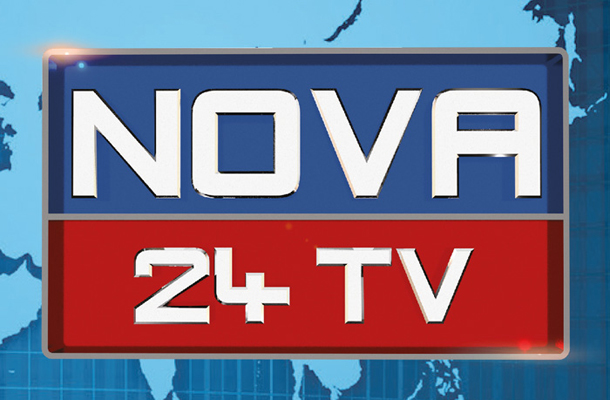
Credit: NOVA24TV
At the same time as trying to undermine the country’s mainstream media, Janša’s administration has also been attempting to amplify pro-government media close to SDS and influence coverage at other outlets.
“Previous governments both right, centrist and left have tried to exert some form of influence over the media in Slovenia”, Cirman, of Necenzurirano, said. “Every new government has a tendency to try and put media into a situation editorially where they cannot hurt them, to soften criticism. This is common practice. But none have done it so radically as the Janša governments.”
Among those outlets to have had a new, more government friendly editor installed since Janša returned to power were Siol.net, which is owned by state-owned company Telekom. Since then observers have noted a change in its editorial tone and a blunting of its criticism of the government. It has also been far more critical of the anti-government protests in Ljubljana that have continued for fifteen weeks.
Meanwhile, starting in May the PM also began appearing regularly on Nova24TV, a right-wing news founded in 2015 by mostly members and supporters of the SDS party. Though its viewership remains relatively low, Janša has made every effort to boost the visibility of the station since returning to office. Much of this takes the form of daily retweets and a weekly exclusive show entitled “Conversation with the Prime Minister”. Nova24TV regularly smears other Slovenian journalists and parrots attacks on the public broadcaster.
[NE SPREGLEJTE] @JJansaSDS bo v živo gost pogovorne oddaje na @Nova24TV. V oddaji bo govora o najbolj izpostavljenih in aktualnih temah preteklega tedna. Vljudno vabljeni k ogledu! pic.twitter.com/ay93NJrGNk
— Vlada Republike Slovenije (@vladaRS) May 18, 2020
But notably, the government’s support for the outlet is not just political. In a move reminiscent of previous Janša administrations, advertising revenue from state-owned companies has also been channelled to its owner, NTV24.si. According to Oštro, it received €120,000 in taxpayer money from various sources of public funding in the first half of 2020, a sizable increase in the previous period. The channelling of state advertising revenue to pro-government media outlets is a hallmark of media capture, as the Orbán regime has shown.
Influence Expanding: The Hungary Connection
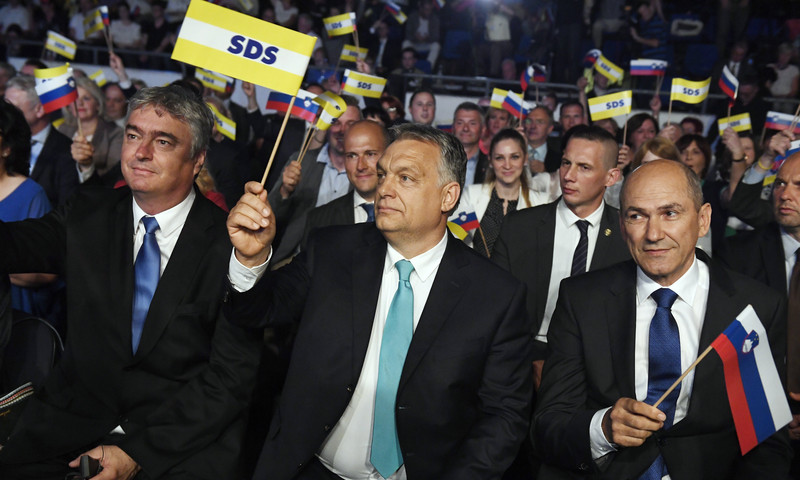
Hungarian Prime Minister Viktor Orban (C), Slovenian Prime Minister and leader of the Slovenian Democratic Party (SDS) Janez Jansa attend a campaign event of SDS in Celje, Slovenia, 11 May 2018. EPA-EFE/Szilard Koszticsak.
As well as receiving increasing amounts of money from state funds, NTV24.si has also allegedly received €1.5 million from Hungarian businesspeople close to the ruling FIDESZ party of Viktor Orbán, whose government has progressively dismantled media freedom in Hungary over the past decade. Three Hungarian media companies have also acquired a combined majority stake in Nova24TV since it was set up by the SDS in 2015, carefully sidestepping acquisition laws while doing so. All three companies are part of the KESMA, a foundation under effective control of FIDESZ.
In 2017 one of those companies, Ripost Media, also acquired a 45 percent stake in the Slovenian publishing house which owns Demokracija, a right-wing political weekly set up by SDS in the 1990s. The magazine has also received funding from Hungarian businessman close to FIDESZ. It often espouses far-right views on topics such as immigration and multiculturalism shared by Orbán and Janša and in March likened a group of critical journalists to “Slovenian ISIS”.
In the latest sign of expanding Hungarian influence, in July 2020 it was confirmed that state-owned telecoms company Telekom Slovenia had agreed to sell 100 percent of its stake in Planet TV to Hungarian media company TV2 Media, which is also owned by a Hungarian businessman linked to FIDESZ. At the time, the investigative news website which broke the news, Necenzurirano, also reported on unofficial plans to merge Planet TV and Nova24TV.
These expanding financial links between Hungarian business interests and Slovenian media reflect the shared political ideologies of the two country’s leaders. Both liberal freedom fighters in their country’s struggles for independence, Orbán and Janša drifted further to the right and embraced xenophobic, anti-immigration politics. However, the parallels don’t stop there.
“The main similarity is the disdain both men have for the media as one of the pillars of a free society”, Bitenc said. “They both consider outlets either as useful tools for their propaganda machines or as nuisances to be dealt with. And they both have illiberal tendencies.” Using the model in Hungary, Janša has also begun to emulate elements of the “Orbán model” for suppressing and controlling media, he added.
The pattern is clear to see: both have helped slowly create a network of right-wing media close to the ruling party; both have used this network to denounce and smear critical journalists and political enemies, both have utilized state resources to punish critical outlets and reward government mouthpieces; and both have moved to take greater control over the editorial bodies and policy of their countries’ public broadcasters.
Conclusion: Deteriorating Press Freedom
Taken together, the combined effect on press freedom over the last six months has been rapid and significant. Journalists in Slovenia are now working in a far more antagonistic climate, one in which staunch criticism of the prime minister risks immediate rebuke. Janša’s inflammatory attacks on journalists and media outlets are, observers say, only further corroding public discourse and worsening growing polarization, leading to increased online harassment.
Much of this animosity towards the press stems from a history of grievances and perceived bias. Moves to undermine mainstream and established media are justified as creating a fairer and more pluralistic media landscape. In reality, over many years the SDS has helped create a system of deeply partisan, far-right outlets bloated by public funds and propped up by Hungarian businessmen linked to Orbán, the EU’s top enemy of press freedom.
Concerns that Slovenia will become another illiberal democracy akin to Hungary are, for now, premature. Nonetheless the exporting of Hungarian methods to Slovenia and other states in Central and South Eastern European countries should worry EU leaders. Going forward, institutions such as the Organisation for Security and Co-operation in Europe (OSCE), the European Union (EU), the Council of Europe (COE) must follow ongoing developments in Slovenia closely and react strongly to further press freedom violations.
In the coming weeks, all eyes will be focused on the end of the public consultation into the legislative amendments to the public broadcaster and press agency. If little changes in the proposals and the SDS and its coalition partners are successful, the overhaul of the country’s media space will have gained considerable momentum – one which may well gather further speed in the months ahead.
 This statement is part of the Media Freedom Rapid Response (MFRR), which tracks, monitors and responds to violations of press and media freedom in EU Member States and Candidate Countries. This project provides legal and practical support, public advocacy and information to protect journalists and media workers.
This statement is part of the Media Freedom Rapid Response (MFRR), which tracks, monitors and responds to violations of press and media freedom in EU Member States and Candidate Countries. This project provides legal and practical support, public advocacy and information to protect journalists and media workers.


